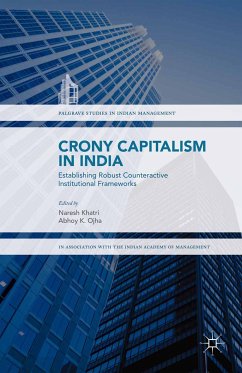Crony Capitalism in India (eBook, PDF)
Establishing Robust Counteractive Institutional Frameworks
Redaktion: Khatri, Naresh; Ojha, Abhoy
73,95 €
73,95 €
inkl. MwSt.
Sofort per Download lieferbar

37 °P sammeln
73,95 €
Als Download kaufen

73,95 €
inkl. MwSt.
Sofort per Download lieferbar

37 °P sammeln
Jetzt verschenken
Alle Infos zum eBook verschenken
73,95 €
inkl. MwSt.
Sofort per Download lieferbar
Alle Infos zum eBook verschenken

37 °P sammeln
Crony Capitalism in India (eBook, PDF)
Establishing Robust Counteractive Institutional Frameworks
Redaktion: Khatri, Naresh; Ojha, Abhoy
- Format: PDF
- Merkliste
- Auf die Merkliste
- Bewerten Bewerten
- Teilen
- Produkt teilen
- Produkterinnerung
- Produkterinnerung

Bitte loggen Sie sich zunächst in Ihr Kundenkonto ein oder registrieren Sie sich bei
bücher.de, um das eBook-Abo tolino select nutzen zu können.
Hier können Sie sich einloggen
Hier können Sie sich einloggen
Sie sind bereits eingeloggt. Klicken Sie auf 2. tolino select Abo, um fortzufahren.

Bitte loggen Sie sich zunächst in Ihr Kundenkonto ein oder registrieren Sie sich bei bücher.de, um das eBook-Abo tolino select nutzen zu können.
Crony Capitalism in India provides a comprehensive and scholarly examination of the important topic of crony capitalism, filling an important gap in the market. Bringing together experts from various backgrounds, it addresses the key underpinnings of this complex and multifarious issue. Given the emergent nature of the Indian economy, this book provides important information for decision makers in both government and business to help establish a robust institutional framework that is so desperately needed both in India and globally.
- Geräte: PC
- ohne Kopierschutz
- eBook Hilfe
- Größe: 6.44MB
Andere Kunden interessierten sich auch für
![Critical Management Ethics (eBook, PDF) Critical Management Ethics (eBook, PDF)]() T. KlikauerCritical Management Ethics (eBook, PDF)73,95 €
T. KlikauerCritical Management Ethics (eBook, PDF)73,95 €![Evolving Digital Leadership (eBook, PDF) Evolving Digital Leadership (eBook, PDF)]() James BrettEvolving Digital Leadership (eBook, PDF)48,95 €
James BrettEvolving Digital Leadership (eBook, PDF)48,95 €![Exploring Dynamic Mentoring Models in India (eBook, PDF) Exploring Dynamic Mentoring Models in India (eBook, PDF)]() Exploring Dynamic Mentoring Models in India (eBook, PDF)81,95 €
Exploring Dynamic Mentoring Models in India (eBook, PDF)81,95 €![Impact of International Business (eBook, PDF) Impact of International Business (eBook, PDF)]() Impact of International Business (eBook, PDF)73,95 €
Impact of International Business (eBook, PDF)73,95 €![Talent Management in Emerging Market Firms (eBook, PDF) Talent Management in Emerging Market Firms (eBook, PDF)]() Marina LatukhaTalent Management in Emerging Market Firms (eBook, PDF)89,95 €
Marina LatukhaTalent Management in Emerging Market Firms (eBook, PDF)89,95 €![Doing Business in ASEAN Markets (eBook, PDF) Doing Business in ASEAN Markets (eBook, PDF)]() Doing Business in ASEAN Markets (eBook, PDF)27,95 €
Doing Business in ASEAN Markets (eBook, PDF)27,95 €![The High Engagement Work Culture (eBook, PDF) The High Engagement Work Culture (eBook, PDF)]() D. BowlesThe High Engagement Work Culture (eBook, PDF)40,95 €
D. BowlesThe High Engagement Work Culture (eBook, PDF)40,95 €-
-
-
Crony Capitalism in India provides a comprehensive and scholarly examination of the important topic of crony capitalism, filling an important gap in the market. Bringing together experts from various backgrounds, it addresses the key underpinnings of this complex and multifarious issue. Given the emergent nature of the Indian economy, this book provides important information for decision makers in both government and business to help establish a robust institutional framework that is so desperately needed both in India and globally.
Dieser Download kann aus rechtlichen Gründen nur mit Rechnungsadresse in A, B, BG, CY, CZ, D, DK, EW, E, FIN, F, GR, HR, H, IRL, I, LT, L, LR, M, NL, PL, P, R, S, SLO, SK ausgeliefert werden.
Produktdetails
- Produktdetails
- Verlag: Palgrave Macmillan UK
- Seitenzahl: 228
- Erscheinungstermin: 17. Juli 2017
- Englisch
- ISBN-13: 9781137582874
- Artikelnr.: 48867518
- Verlag: Palgrave Macmillan UK
- Seitenzahl: 228
- Erscheinungstermin: 17. Juli 2017
- Englisch
- ISBN-13: 9781137582874
- Artikelnr.: 48867518
- Herstellerkennzeichnung Die Herstellerinformationen sind derzeit nicht verfügbar.
Naresh Khatri is Associate Professor at the Department of Health Management and Informatics, University of Missouri, US. Before joining the University of Missouri, he was a faculty in the Department of Strategic Management and Organization at the Nanyang Business School, Nanyang Technological University, Singapore. Dr Khatri has authored two scholarly books and published around 60 research articles and book chapters in various peer-reviewed journals. He is also the Senior Associate Editor of South Asian Journal of Global Business Research and the Associate Editor of IIMB Management Review. He is on the Editorial Board of Health Care Management Review, Journal of Hospital Administration, and Journal of Management and Public Policy. Abhoy K Ojha is a Professor in Organizational Behaviour and Human Resources Management at the Indian Institute of Management, Bangalore, India. Prior to joining IIMB he was Assistant Professor at Laurentian University, Sudbury, Canada and workedas an engineer in the Bombay Division of the Oil and Natural Gas Commission. Abhoy has been a member of many professional bodies including the Academy of Management, Administrative Sciences Association of Canada and Indian Academy of Management, and on editorial boards of journals including IIMB Management Review and South Asian Journal of Global Business Research. He has also undertaken several consulting and training assignments in the private sector as well as in the government and public sector.
PART I: CRONYISM, CORRUPTION, AND CRONY CAPITALISM
1. Definitions of Cronyism, Corruption, and Crony Capitalism; Naresh Khatri
2. Khatri, N. and Tsang, E.W.K. 2003. Antecedents and consequences of cronyism in organizations. Journal of Business Ethics, 43: 289-303. (With Permission from Springer)
3. Khatri, N., Tsang, E.W.K., and Begley, T. 2006. Cronyism: A cross-cultural analysis. Journal of International Business Studies, 37(1): 61-75.
(With Permission from Palgrave)
PART II: INDIAN BRAND OF CRONY CAPITALISM
4. Indian Economic Philosophy and Crony Capitalism
(Naresh Khatri, University of Missouri, Columbia, Missouri, USA and Abhoy K. Ojha, Indian Institute of Management, Bangalore, India)
Chapter 5: Crony Capitalism in India: Including the Institutional Context to Understand and Counter It
(Abhoy K. Ojha, Indian Institute of Management, Bangalore, India)
Chapter 6: Cultural Correlates of Crony Capitalism in India
(Tejinder K. Billing andAndrea Farro, Rowan University, Glassboro, New Jersey, USA)
Chapter 7: Crony Capitalism and India's Political System
(Rajeev Gowda, Member of Parliament, Rajya Sabha and Nandan Sharalaya, Parliamentary Analysis Space, India)
Chapter 8: Crony Capitalism and Family Oligarchies in India
(Arup Varma, Loyola University, Chicago; Biyun Hu, Temple University, Philadelphia; and Lisa Bloomquist, Price Waterhouse Coopers, Chicago, Illinois, USA)
Chapter 9: Indian Administrative Service and Crony Capitalism
(Vishal Gupta, Indian Institute of Management, Ahmedabad, India)
Chapter 10: Indian Judiciary and Enforceable Measures against Crony Capitalism
(Anil B. Suraj, Indian Institute of Management, Bangalore, India)
1. Definitions of Cronyism, Corruption, and Crony Capitalism; Naresh Khatri
2. Khatri, N. and Tsang, E.W.K. 2003. Antecedents and consequences of cronyism in organizations. Journal of Business Ethics, 43: 289-303. (With Permission from Springer)
3. Khatri, N., Tsang, E.W.K., and Begley, T. 2006. Cronyism: A cross-cultural analysis. Journal of International Business Studies, 37(1): 61-75.
(With Permission from Palgrave)
PART II: INDIAN BRAND OF CRONY CAPITALISM
4. Indian Economic Philosophy and Crony Capitalism
(Naresh Khatri, University of Missouri, Columbia, Missouri, USA and Abhoy K. Ojha, Indian Institute of Management, Bangalore, India)
Chapter 5: Crony Capitalism in India: Including the Institutional Context to Understand and Counter It
(Abhoy K. Ojha, Indian Institute of Management, Bangalore, India)
Chapter 6: Cultural Correlates of Crony Capitalism in India
(Tejinder K. Billing andAndrea Farro, Rowan University, Glassboro, New Jersey, USA)
Chapter 7: Crony Capitalism and India's Political System
(Rajeev Gowda, Member of Parliament, Rajya Sabha and Nandan Sharalaya, Parliamentary Analysis Space, India)
Chapter 8: Crony Capitalism and Family Oligarchies in India
(Arup Varma, Loyola University, Chicago; Biyun Hu, Temple University, Philadelphia; and Lisa Bloomquist, Price Waterhouse Coopers, Chicago, Illinois, USA)
Chapter 9: Indian Administrative Service and Crony Capitalism
(Vishal Gupta, Indian Institute of Management, Ahmedabad, India)
Chapter 10: Indian Judiciary and Enforceable Measures against Crony Capitalism
(Anil B. Suraj, Indian Institute of Management, Bangalore, India)
PART I: CRONYISM, CORRUPTION, AND CRONY CAPITALISM
1. Definitions of Cronyism, Corruption, and Crony Capitalism; Naresh Khatri
2. Khatri, N. and Tsang, E.W.K. 2003. Antecedents and consequences of cronyism in organizations. Journal of Business Ethics, 43: 289-303. (With Permission from Springer)
3. Khatri, N., Tsang, E.W.K., and Begley, T. 2006. Cronyism: A cross-cultural analysis. Journal of International Business Studies, 37(1): 61-75.
(With Permission from Palgrave)
PART II: INDIAN BRAND OF CRONY CAPITALISM
4. Indian Economic Philosophy and Crony Capitalism
(Naresh Khatri, University of Missouri, Columbia, Missouri, USA and Abhoy K. Ojha, Indian Institute of Management, Bangalore, India)
Chapter 5: Crony Capitalism in India: Including the Institutional Context to Understand and Counter It
(Abhoy K. Ojha, Indian Institute of Management, Bangalore, India)
Chapter 6: Cultural Correlates of Crony Capitalism in India
(Tejinder K. Billing andAndrea Farro, Rowan University, Glassboro, New Jersey, USA)
Chapter 7: Crony Capitalism and India's Political System
(Rajeev Gowda, Member of Parliament, Rajya Sabha and Nandan Sharalaya, Parliamentary Analysis Space, India)
Chapter 8: Crony Capitalism and Family Oligarchies in India
(Arup Varma, Loyola University, Chicago; Biyun Hu, Temple University, Philadelphia; and Lisa Bloomquist, Price Waterhouse Coopers, Chicago, Illinois, USA)
Chapter 9: Indian Administrative Service and Crony Capitalism
(Vishal Gupta, Indian Institute of Management, Ahmedabad, India)
Chapter 10: Indian Judiciary and Enforceable Measures against Crony Capitalism
(Anil B. Suraj, Indian Institute of Management, Bangalore, India)
1. Definitions of Cronyism, Corruption, and Crony Capitalism; Naresh Khatri
2. Khatri, N. and Tsang, E.W.K. 2003. Antecedents and consequences of cronyism in organizations. Journal of Business Ethics, 43: 289-303. (With Permission from Springer)
3. Khatri, N., Tsang, E.W.K., and Begley, T. 2006. Cronyism: A cross-cultural analysis. Journal of International Business Studies, 37(1): 61-75.
(With Permission from Palgrave)
PART II: INDIAN BRAND OF CRONY CAPITALISM
4. Indian Economic Philosophy and Crony Capitalism
(Naresh Khatri, University of Missouri, Columbia, Missouri, USA and Abhoy K. Ojha, Indian Institute of Management, Bangalore, India)
Chapter 5: Crony Capitalism in India: Including the Institutional Context to Understand and Counter It
(Abhoy K. Ojha, Indian Institute of Management, Bangalore, India)
Chapter 6: Cultural Correlates of Crony Capitalism in India
(Tejinder K. Billing andAndrea Farro, Rowan University, Glassboro, New Jersey, USA)
Chapter 7: Crony Capitalism and India's Political System
(Rajeev Gowda, Member of Parliament, Rajya Sabha and Nandan Sharalaya, Parliamentary Analysis Space, India)
Chapter 8: Crony Capitalism and Family Oligarchies in India
(Arup Varma, Loyola University, Chicago; Biyun Hu, Temple University, Philadelphia; and Lisa Bloomquist, Price Waterhouse Coopers, Chicago, Illinois, USA)
Chapter 9: Indian Administrative Service and Crony Capitalism
(Vishal Gupta, Indian Institute of Management, Ahmedabad, India)
Chapter 10: Indian Judiciary and Enforceable Measures against Crony Capitalism
(Anil B. Suraj, Indian Institute of Management, Bangalore, India)







